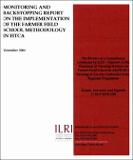Monitoring and backstopping report on the implementation of the farmer field school methodology in FITCA.

(en=English; ar=Arabic; fr=French; pt=Portuguese)
Authors
African Union Inter-African Bureau for Animal Resources
AU-IBAR
Item Usage Stats
133
views
views
40
downloads
downloads
Abstract
The Farmer Field School (FFS) methodology, an informal adult education approach, has been introduced in the final phases of The Farming in Tse-tse Controlled Areas Programme in Kenya, Uganda and Tanzania (7 ACP RPR 578). In May 2004, 36 livestock officers, selected by government departments of the countries and Rwanda, underwent a two-week Training of Facilitator course organized by the International Livestock Research Institute (ILRI). Out of the 36 officers (called FFS facilitators); the three facilitators in Rwanda did not pursue any FFS activities and are therefore not considered in the report. In Tanzania, one facilitator left to conduct a study and thus from June to October 2004, 32 facilitators carried out the FFS ground working activities. Ground working in a FFS entails site- and participant-selection; formal establishment of the FFS groups and putting together a grant proposal. In Kenya and Bukoba/Karagwe District in Tanzania, the grant proposals have been approved in August 2004 and the schools have been implementing sessions and Participatory Technology Development trials since then In Tanga/Pangani/Handeni District in Tanzania and Uganda, the grant proposals were only approved during the second support mission conducted by ILRI in October 2004_ At present 32 FFS are registered aiming to turn 792 farmers into experts in diary, poultry and crop production. The majority of the FFS enterprises focus on diary and poultry production. Only three FFS in Uganda include crop production. The FITCA programme is ending in December 2004 and as a result auditing activities and lack of a replenishment of EU funding, hampered effective FFS implementation. Consequently the FFS which were ready to start could not receive the grants. Even though, the FFS groups initiated self-sponsorship activities (personal contribution and income generation activities) the shortage in funds delayed the FFS implementation and therefore at this stage little can be said about the effect of the FFS in FITCA. What has been monitored is the perception of the actors involved and the situation at present. The FFS has been received positively and all actors involved are eager to work with the methodology. The majority of the schools have just started or are about to do so, even though FITCA as a programme is ending in Tanzania and Kenya. Under the assumption that all grants will be released, the FFS is capable to continue and complete a full cycle. However, additional assistance is required in order to ensure FFS implementation which is sustainable and of good quality. The facilitators need support from their employers in terms of time, specific training (e.g. experimentation techniques), and moral and technical backstopping. In Uganda, FITCA can take up this role as the programme will be extended for two more years. In Tanzania and Kenya, it is recommended to explore the opportunities to link up with the Ministry of Livestock and the Veterinary Departments, and NGOs active in the specific areas. The FFS methodology as used in FITCA functions as an exit strategy but it will only work well when it is a well thought-through and planned strategically. Therefore it is highly recommended that the FFS methodology is assessed well by its implementers and joint action plans (with the government and NGOs) are developed to ensure sustainability and future development of the FFS.